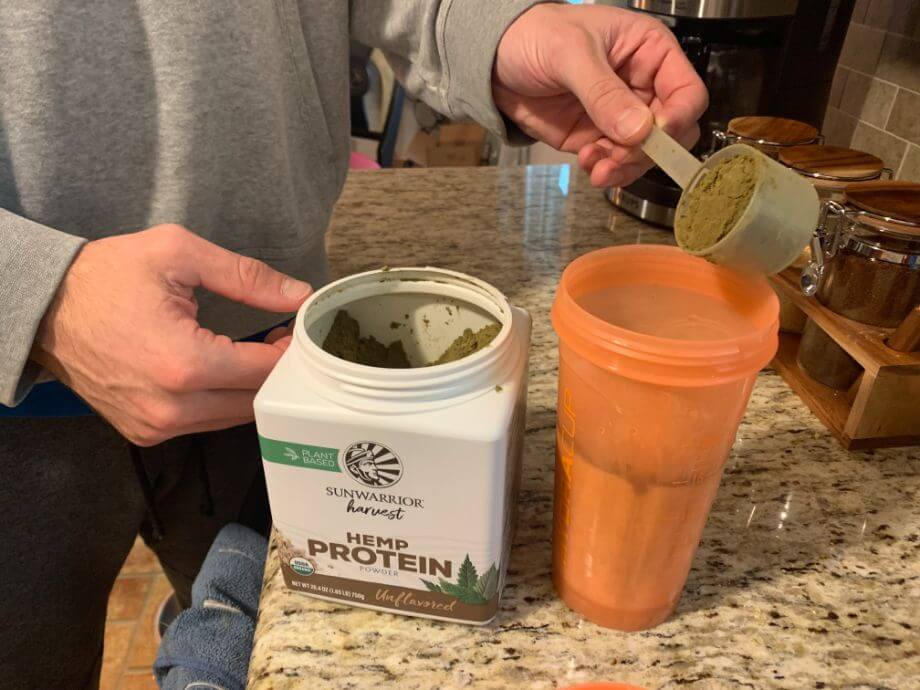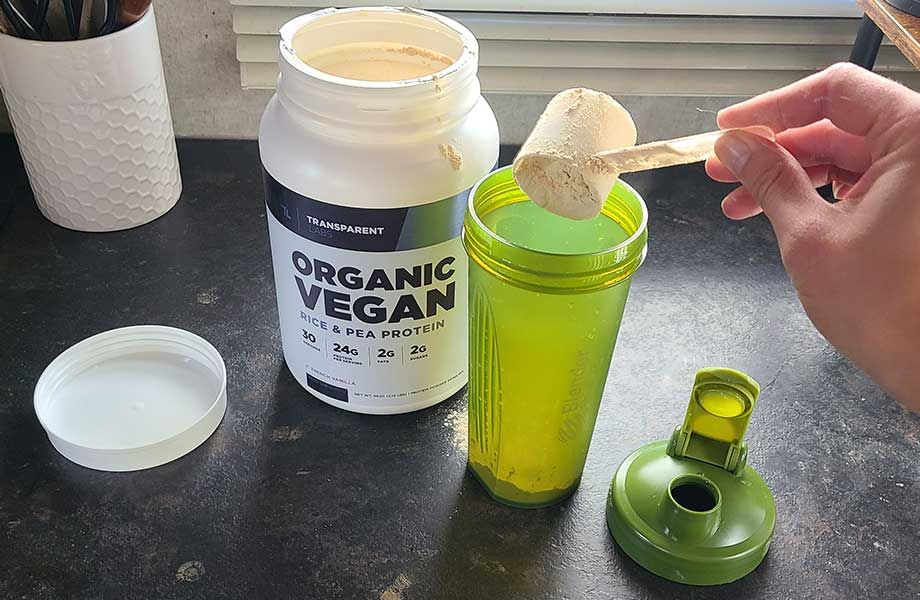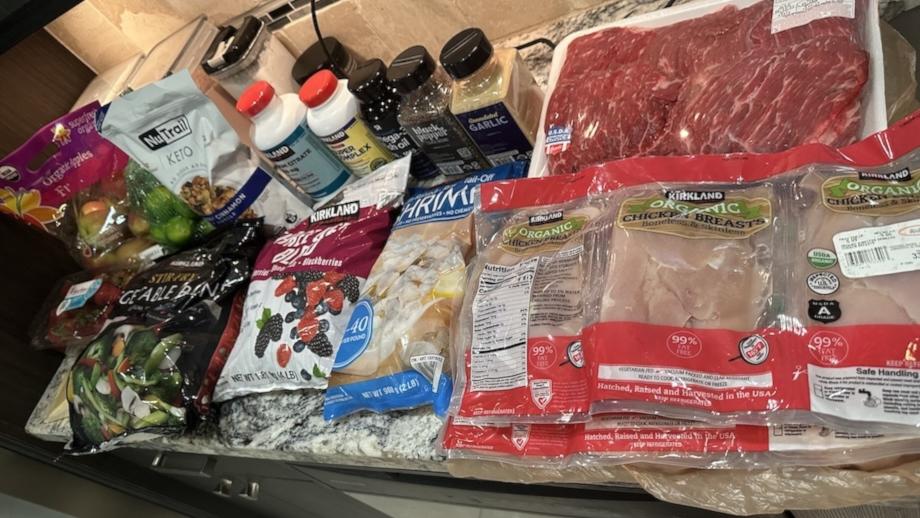With plant-based diets increasing in popularity, more people are including vegan protein powders in their diets. These powders are derived from a variety of plant sources such as soy, peas, brown rice, and hemp, and can offer an array of benefits.
Plant-based protein powders can be an excellent source of essential amino acids, vitamins, and minerals, although their nutrient content will vary depending on the plant used. They also tend to be easily digestible, making them a good option for many people with digestive issues or who are intolerant to dairy products. Plant-based protein powders are also sustainable and environmentally friendly, as they require less water and produce fewer greenhouse gas emissions than animal-based protein powders.
Here, we’ll dive deeper into the various plant-based protein powder benefits and how these supplements can help you achieve your health and fitness goals.

Medical disclaimer: This article is intended for educational and informational purposes only. It is not intended as a substitute for medical advice. For health advice, contact a licensed healthcare provider.
What is Plant-Based Protein Powder?
Plant-based protein powder is a dietary supplement made by taking a plant-based, high-protein food and isolating its proteins while removing most of the carbohydrates and fat. You’re left with a protein-rich powder that can be consumed in a variety of ways.
Because protein is the primary macronutrient for building muscle, plant protein powders are often used by people looking to gain muscle size and strength. They’re also used by people who struggle to get enough protein from food, whether due to high protein requirements, food allergies or intolerances, or a poor appetite.
Plant-based protein powders typically provide around 20-25 grams of protein per serving. They also contain antioxidants and some vitamins and minerals, such as iron and calcium.
RELATED: How Much Protein Do I Need?
Types of Plant-Based Protein Powder
Plant protein powders are made from a variety of different plant foods, most often from plants considered to contain all nine essential amino acids in optimal amounts for use by the human body. These are known as “complete proteins.”
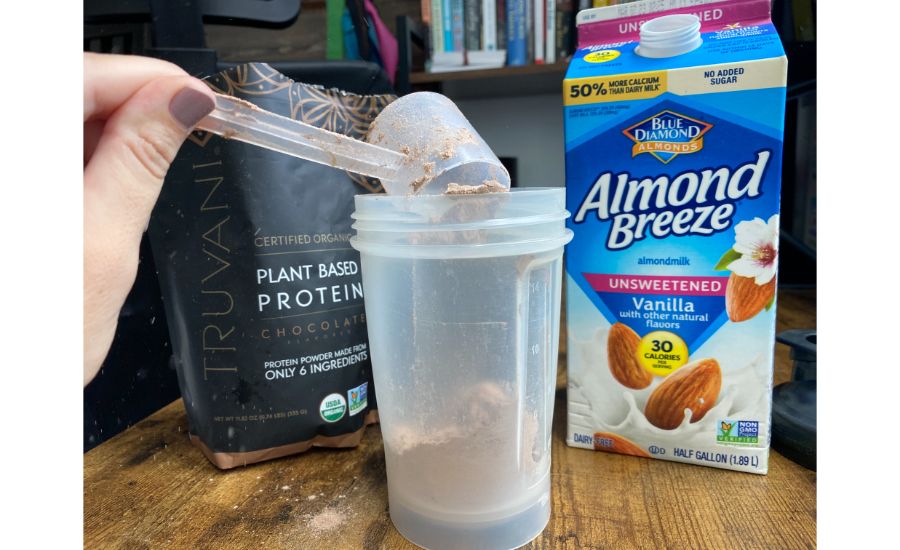
Other plants considered to be “incomplete proteins” can also be used, however. They may be combined with protein powders made from other plant sources that contain certain amino acids in higher amounts for a more balanced amino acid profile overall, or they may be used on their own. The most common types of plant-based protein powders are listed below.
RELATED: Best Protein Powder for Men
Soy protein powder
Soy protein powder is made from soybeans, one of the most well-known complete proteins among plant-based foods. It is one of the most widely studied plant proteins and is very popular among people following a plant-based lifestyle.
Pea protein powder
Pea protein has experienced a substantial rise in popularity within the last few years and is a great option for people who are allergic to soy or intolerant to gluten. It is made from yellow split peas (not the green ones in your freezer) and is used in many non-dairy milk alternatives and vegan protein shakes.
Hemp protein powder
Made from hemp seeds, hemp protein powder is another complete protein source that is gluten-free and should work well for most people with food allergies.
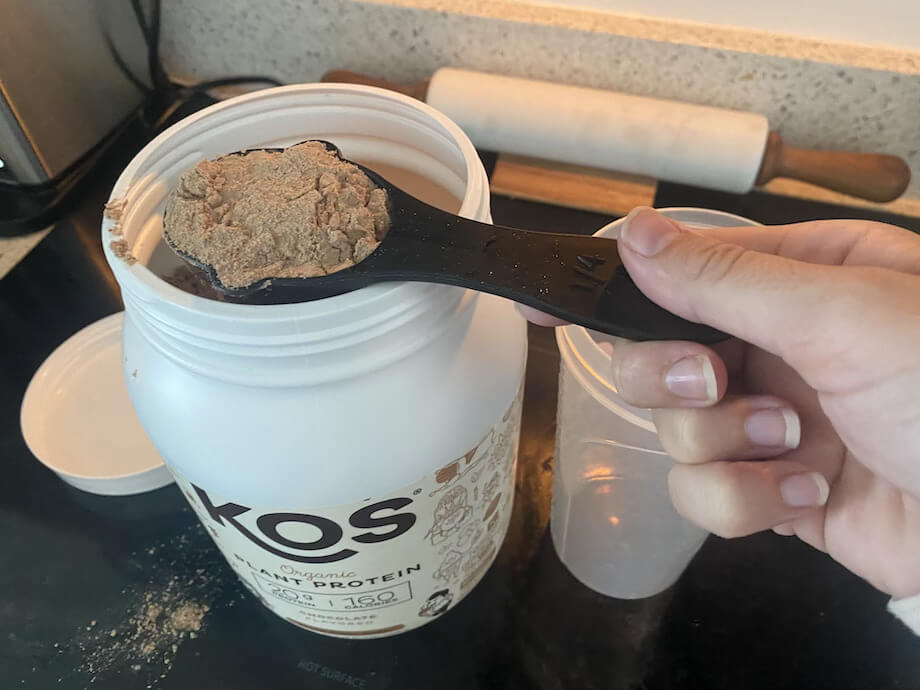
Chia protein powder
Chia seeds are tiny omega-3 rich seeds that also provide all of the essential amino acids in optimal amounts for health. While most of the omega-3s are removed during the production process, chia seed powder retains much of the calcium found in whole chia seeds and is allergen-friendly.
Brown rice protein powder
Unlike the previous types of protein powder listed, brown rice is not considered a complete protein as it is slightly lower in lysine, one of the essential amino acids. Despite this limitation, a small June 2013 study1 found no differences between whey or brown rice protein consumed during a resistance training program on measures of muscle thickness and strength.
However, a major limitation of this study is that it lacked a control group. Additional research is needed in order to confirm the effectiveness of brown rice protein compared to more well-researched types of protein powders.
Quinoa protein powder
Quinoa is well-known as a grain that is also a complete protein, making it a great option when choosing a plant-based protein powder.

Pumpkin seed protein powder
Pumpkin seeds are one of the highest-protein seeds, making them a popular choice for protein supplements. They aren’t a complete protein, so you may find pumpkin seed protein powder combined with other proteins.
Protein blends
Some incomplete protein sources may be combined with protein powders from other plants in order to provide a more balanced amino acid profile. An example of this is the common combination of pea protein with brown rice protein.
RELATED: Best Organic Protein Powder
Plant-Based Protein Powder Benefits
It can help build bigger muscles
Have you ever heard someone say that you can’t build muscle with plants? Fortunately, this myth is unfounded.
The process of building muscle requires essential amino acids, and most plant-based protein powders supply these in adequate amounts. While research is limited on some of the less commonly used protein powders like chia and quinoa, evidence suggests that pea and soy proteins may be as effective for increasing the size of your muscles as whey.

A December 2019 systematic review in the Journal of Health Sciences2 found that four out of six studies showed no differences in muscle mass when comparing soy to whey, with the remaining two studies finding that whey was more effective.
RELATED: How to Build Muscle
It can help build strength
In addition to increasing muscle size, plant protein powders can also support your strength goals.
Studies particularly support the equal benefits of soy and whey for strength, as found by a November 2018 meta-analysis in the International Journal of Sport Nutrition and Exercise Metabolism3. A large May 2020 randomized controlled trial4 had similar results when matching soy and whey protein for leucine content.
Like soy, pea protein may also be as effective as whey protein for both muscle size and strength despite not being a complete protein. This was the result found by a small January 2019 study published in Sports5 and a larger January 2015 study in the Journal of the International Society of Sports Nutrition6.
RELATED: Best Protein Powder for Women
It’s environmentally friendly
Plant proteins are often considered to be more sustainable than their animal-based counterparts. This is because growing and processing plants for protein powder requires less water and produces fewer greenhouse gas emissions than animal-based proteins like whey, casein, egg white, and collagen.
RELATED: Best Casein Protein Powder
It may be easier to digest
Many people with lactose intolerance experience uncomfortable digestive side effects like bloating or diarrhea when consuming whey protein powders due to the small amount of lactose they can contain. Plant-based proteins don’t contain lactose, so they may be a better choice for some people.
That said, plant proteins may cause digestive issues in people who have irritable bowel syndrome (IBS). Monash University advises that plant protein powders may contain FODMAPs7 (small sugars present in some plants), so people who are intolerant to FODMAPs should keep this in mind when choosing a protein powder.
It’s a convenient way to get more protein
Protein powders are one of the easiest ways to increase the amount of protein in your diet thanks to their versatility. They can be:
- Mixed with water or milk
- Blended into a fruit smoothie
- Stirred into oatmeal and protein pancake batter
- Added to homemade energy bites and baked goods
It can help you lose body fat
When paired with a resistance training program and a calorie deficit, a higher protein diet can help you lose more body fat and less muscle during weight loss programs. Dietary protein helps maintain the muscle you already have, prompting the body to burn more fat for energy than it would without the combination of a higher protein diet and resistance training.
RELATED: Best Protein Powder for Weight Loss
It can add variety to your diet
Sick of eating the same protein foods every day? This is where plant protein powders can come in handy. With a variety of flavors, they can add interest to your diet and keep you on track with meeting your fitness goals.
Risks of Plant-Based Protein
Since protein is required by the body for overall health, the risks associated with taking plant-based protein are typically minimal. That said, there are some important considerations to be aware of with these supplements.
Allergic reactions
It goes without saying, but you should avoid using protein powder made from a food that you’re allergic to. Additionally, if you’re allergic to peanuts, it’s possible that you could also have a reaction to pea protein. Peanuts and peas are both legumes and some people who have an allergy to peanuts also react to peas, as found in a July 2021 survey-based study published in Allergy, Asthma, and Immunology8.
Safety
All protein powders are classified as dietary supplements by the FDA, meaning they aren’t as well-regulated as other products like medicine or food. Because of this, the ingredients in any protein powder may not match what’s listed on the label. It’s best to choose a reputable brand that has been third-party tested for quality and purity. An example is a product that has the NSF International Certified for Sport® Certification.
Recently, there have been concerns about heavy metal levels in plant-based protein powders. However, this may not be much cause for concern. An independent August 2020 research study in the journal Toxicology Reports9 found that levels of heavy metals in the protein powders tested were not high enough to cause harm even when consuming up to three servings a day.
Overconsumption
Plant-based protein powders can be extremely helpful in meeting your protein goals, but relying on any protein powder as your main source of protein can lead to an unbalanced diet. As a dietary supplement, they should be just that—a supplement to an overall healthy eating pattern that includes regular meals and snacks.
Plant-Based Protein Powder Benefits: Final Thoughts
Plant-based protein powders can be a valuable, effective source of protein to help meet your health, wellness, and fitness goals. Some benefits of plant-based protein include:
- Supporting muscle growth and strength gains, with the most evidence for soy and pea protein
- Better for the environment overall than animal products
- Providing a quick, convenient source of protein
- Adding variety to the diet
- Assisting with fat loss
- Appropriate for plant-based and vegan diets
Every person is different, so it’s important to choose a plant protein powder that best fits your own dietary needs and preferences.
Plant-Based Protein Powder Benefits: FAQs
Is plant-based protein actually good for you?
Plant-based protein offers a variety of health benefits. It supports muscle growth and strength and helps provide enough protein for the body to produce hormones and enzymes, support a strong immune system, and transport nutrients through the bloodstream.
Do plant-based protein powders work?
Plant-based protein powders have been shown to be effective for building muscle and improving strength, although certain types like soy, pea, and brown rice have been more well-researched than others. They can provide adequate amounts of essential amino acids, especially when “incomplete” proteins like pea and brown rice are combined together to provide a more balanced amino acid profile.
Can you build muscle with plant protein powder?
Yes! Building muscle requires adequate amounts of essential amino acids, which can be provided by plant protein powders. Amino acids are considered the “building blocks” of protein and muscle. You may get the best results by choosing a plant protein powder made from plants considered to be complete proteins, such as soy, quinoa, chia seeds, or hemp seeds. You can also choose a protein blend designed to provide complete proteins, such as a combination of pea protein and brown rice protein.
Can we take plant-based protein powder daily?
Yes, most people should be able to take plant-based protein powders every day to help meet their protein needs. Each person is different, however, and you should pay attention to how plant-based protein powders affect you personally.
These statements have not been evaluated by the Food and Drug Administration. This product is not intended to diagnose, treat, cure, or prevent any diseases.
References
- Joy JM, Lowery RP, Wilson JM, Purpura M, De Souza EO, Wilson SM, Kalman DS, Dudeck JE, Jäger R. The effects of 8 weeks of whey or rice protein supplementation on body composition and exercise performance. Nutr J. 2013 Jun 20;12:86. doi: 10.1186/1475-2891-12-86. PMID: 23782948; PMCID: PMC3698202.
- Da Silva S, Carminati B, de Almeida Santos Junior V, Lollo P. Comparison of the Effects of Soy Protein and Whey Protein Supplementation during Exercise: a Systematic Review. J Health Sci. 2019 Dec; 21(4):397. https://seer.pgsskroton.com/index.php/JHealthSci/article/view/6335. doi: 10.17921/2447-8938.2019v21n4p397-403.
- Messina M, Lynch H, Dickinson JM, Reed KE. No Difference Between the Effects of Supplementing With Soy Protein Versus Animal Protein on Gains in Muscle Mass and Strength in Response to Resistance Exercise. Int J Sport Nutr Exerc Metab. 2018 Nov 1;28(6):674-685. doi: 10.1123/ijsnem.2018-0071. Epub 2018 Oct 26. PMID: 29722584.
- Lynch HM, Buman MP, Dickinson JM, Ransdell LB, Johnston CS, Wharton CM. No Significant Differences in Muscle Growth and Strength Development When Consuming Soy and Whey Protein Supplements Matched for Leucine Following a 12 Week Resistance Training Program in Men and Women: A Randomized Trial. Int J Environ Res Public Health. 2020 May 29;17(11):3871. doi: 10.3390/ijerph17113871. PMID: 32486007; PMCID: PMC7312446.
- Banaszek A, Townsend JR, Bender D, Vantrease WC, Marshall AC, Johnson KD. The Effects of Whey vs. Pea Protein on Physical Adaptations Following 8-Weeks of High-Intensity Functional Training (HIFT): A Pilot Study. Sports (Basel). 2019 Jan 4;7(1):12. doi: 10.3390/sports7010012. PMID: 30621129; PMCID: PMC6358922.
- Babault N, Païzis C, Deley G, Guérin-Deremaux L, Saniez MH, Lefranc-Millot C, Allaert FA. Pea proteins oral supplementation promotes muscle thickness gains during resistance training: a double-blind, randomized, Placebo-controlled clinical trial vs. Whey protein. J Int Soc Sports Nutr. 2015 Jan 21;12(1):3. doi: 10.1186/s12970-014-0064-5. PMID: 25628520; PMCID: PMC4307635.
- Monash University. Protein Powders and IBS. https://www.monashfodmap.com/blog/protein-powders-and-ibs/. Accessed 3/24/23.
- Soller L, La Vieille S, Cameron SB, Mak R, Cook VE, Gerdts J, Chan ES. Allergic reactions to emerging food allergens in Canadian children. Allergy Asthma Clin Immunol. 2021 Jul 13;17(1):71. doi: 10.1186/s13223-021-00573-y. PMID: 34256836; PMCID: PMC8276401.
- Bandara SB, Towle KM, Monnot AD. A human health risk assessment of heavy metal ingestion among consumers of protein powder supplements. Toxicol Rep. 2020 Aug 21;7:1255-1262. doi: 10.1016/j.toxrep.2020.08.001. PMID: 33005567; PMCID: PMC7509468.


